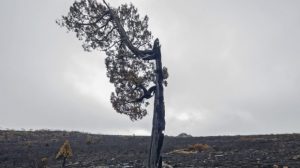Comforting lies or changing what’s possible
Over the last couple of weeks, as I’ve been settling into my new role here at the Green Institute and contemplating the most exciting, energising way to introduce myself to you all, I’ve repeatedly found myself full of angst. This surprised me. I’m not usually one for angst. Those many of you who know me know that I’m generally very positive! And, while I certainly have some trepidation in stepping into Margaret Blakers’ OAM-awarded shoes, that is outweighed by inspiration about what we can do in the years ahead.
Then it dawned on me.

Like so many others, I’ve spent many years relying on the idea, buried in the back of my head, that when the climate crisis really hits, I can retreat to Tasmania with as many of my loved ones as possible.
Intellectually, I’ve always known that that was nothing but a comforting lie. If things are going horribly awry, nowhere will be safe, and the idea that we can hide and shut ourselves off is fundamentally as inequitable and unconstructive as it is unfeasible. And yet it’s an entirely natural and understandable response to have those thoughts. Every activist I know, everyone who truly understands what we’re facing, has them. Some people I respect enormously have already acted on them.
But, in the last couple of weeks, my comforting lie has, quite literally, gone up in smoke. My Facebook feed has been full of devastating images of the spectacular, inspiring, beloved Tasmanian wilderness turned into a picture from Cormac McCarthy’s The Road.
We all tell ourselves comforting lies. For some it’s denying climate science altogether. For others it’s that politics-as-usual can save us. For yet others it’s that, no matter how bad things get, somehow we’ll be ok, we’ll be the exception. This lie collapsing is the reason for my angst.
But it’s also what drives me. Because it leaves us only one option.
If we are to survive this century, we have to survive it together.
And if we’re to survive it together, we have to radically rethink and reconstruct our politics, our society, our culture.
That is what the Green Institute is for. It’s our job to think about where we need to be in 10, 20, 30 years’ time, work out what we need to do to get there, and use strategic interventions to put us on track.
The seeds of change are all around us. The coal industry is dying, and CSG is in retreat. The inhumane treatment of refugees is losing support. The reactionary media is losing influence. Serious candidates for office in the USA and UK are questioning the merits of capitalism. But we have so much still to do.
I’m currently in planning, talking with the board, MPs, members and interested parties, working out the most effective pressure points for social, economic and environmental change to work on – ideas like a Universal Basic Income, creating a pathway to zero emissions, reclaiming the public sphere from corporate takeover, reconnecting with each other and with nature, and rebuilding political debate on peace and disarmament. Over the weeks ahead, Green Agenda will be back, with more opportunities for engagement, as will webinars and public forums, all woven together to create a whole greater than the sum of its parts.
I’d love to hear from you. What are your big ideas? How would you like to engage with the Green Institute?
Remember: politics is the art of the possible, and what we need to achieve is currently impossible. So our path is clear: we need to change what is possible.
Are you with us?
Looking forward to working with you!
Tim
comments
Add comment